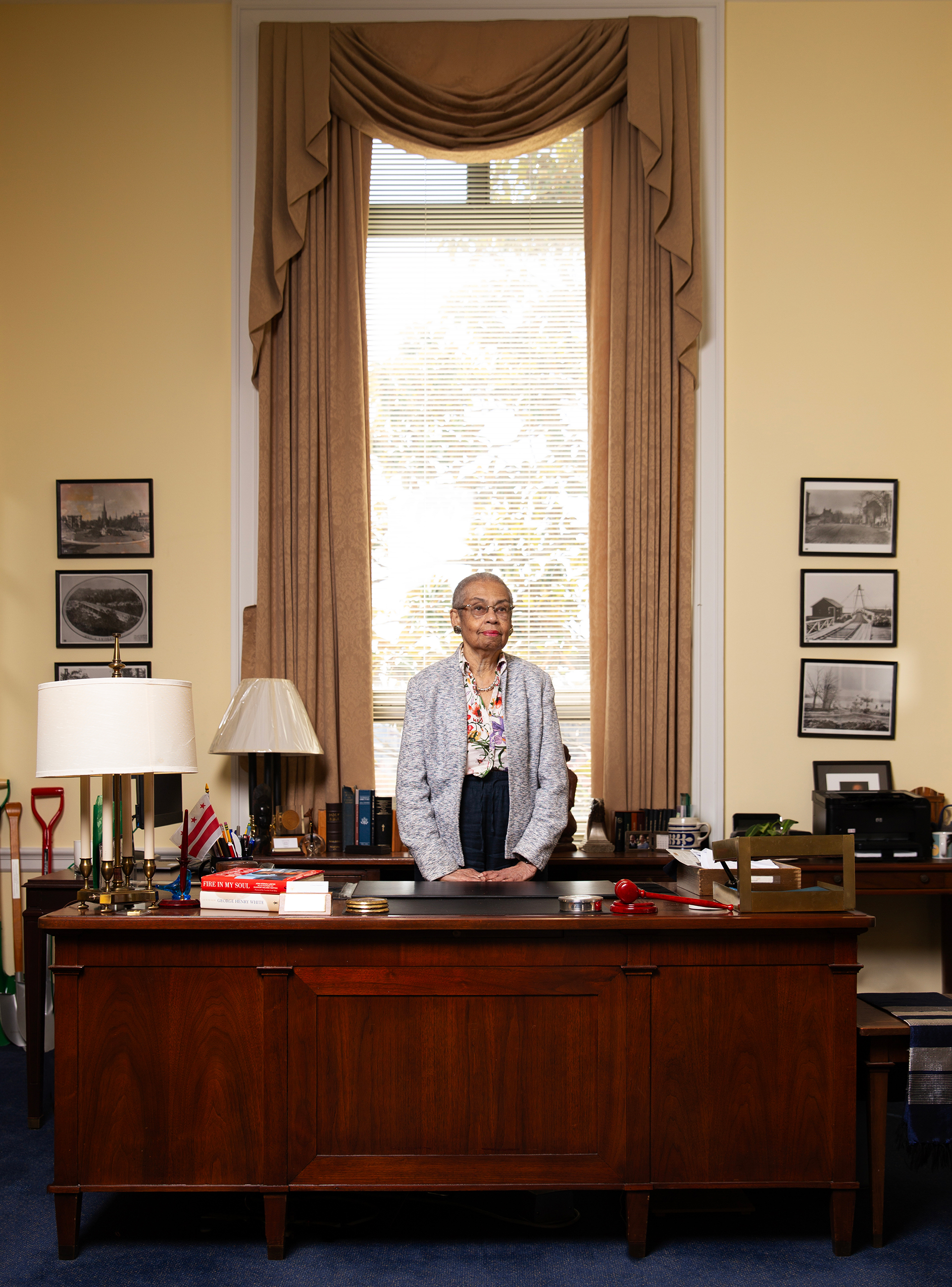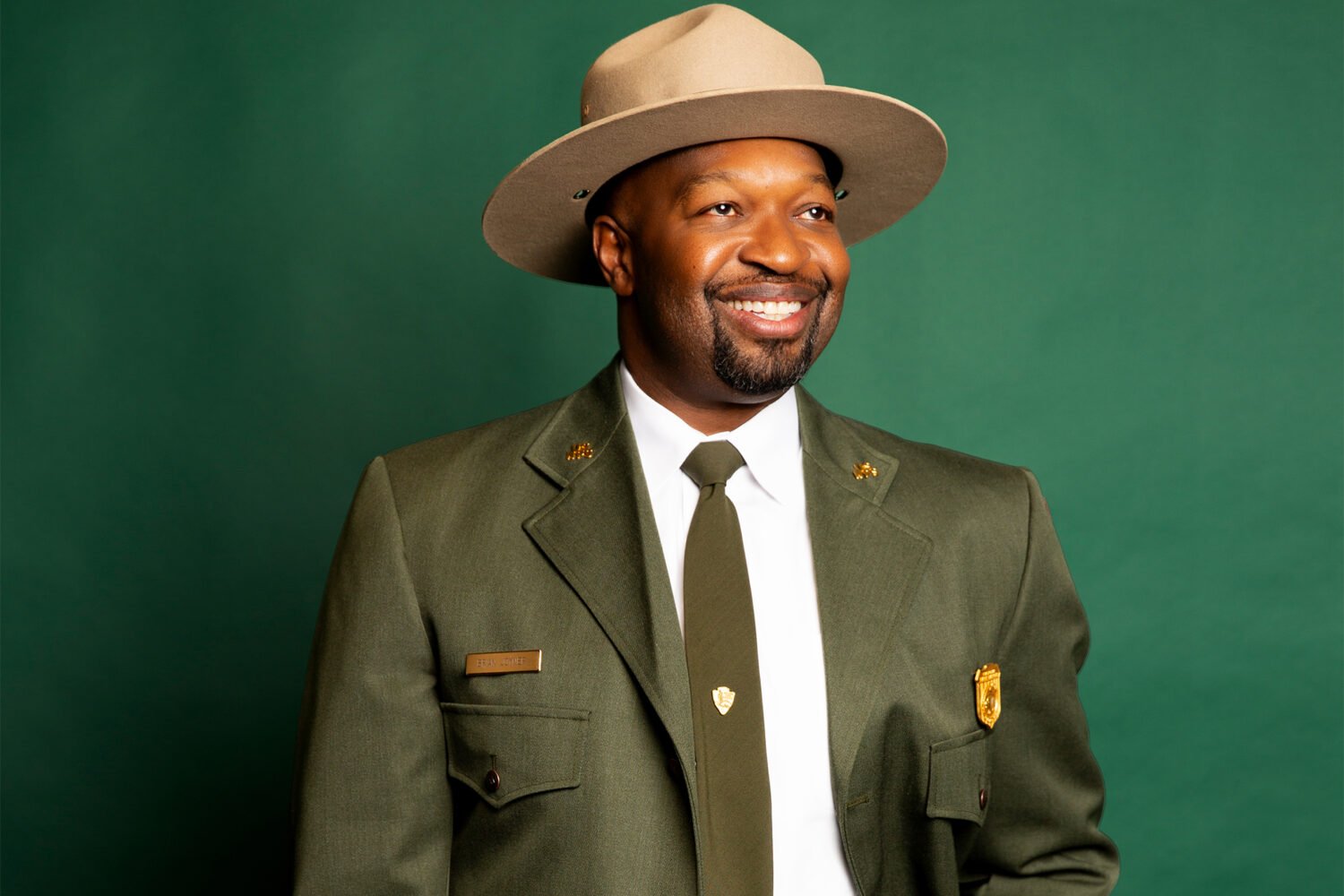as the District of Columbia’s congressional delegate in 1991, Eleanor Holmes Norton attended nearly 500 events. These weren’t just committee hearings on Capitol Hill. Already an accomplished civil-rights activist and law professor, Norton showed up to Advisory Neighborhood Commission meetings and church gatherings. She spent hours standing around the Cleveland Park Metro stop talking to constituents.
“That was about making sure that residents knew me and knew I was going to work very hard for them,” Norton says. “That’s not quite as necessary anymore because I have quite a record to go by and they understand what I’m going to do.”
Today, the 87-year-old Norton is serving her 18th term in Congress and spends far less time out and about. When she does make appearances, they tend to be brief. Last November, at a book launch for equal-employment-opportunity advocate Pierpont Mobley, she appeared to be unable to stand and get to the podium to speak. That same month, Norton attended a ribbon-cutting concert for the Go-Go Museum in Anacostia. Another attendee who’d worked closely with her for years said hello but felt sure she didn’t recognize him.
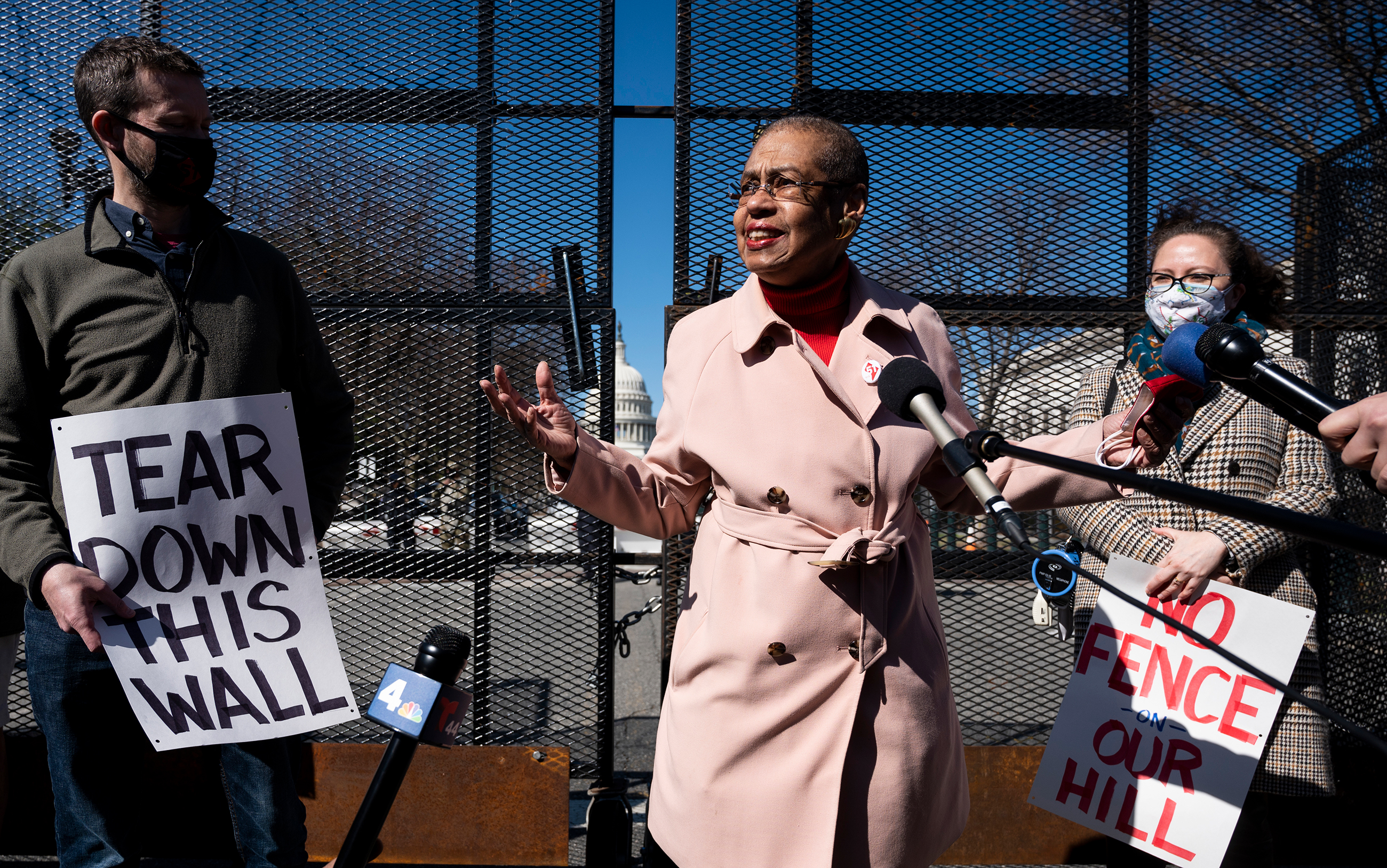
Often called “the warrior on the Hill” by local politicians, Norton is DC’s only elected representative in Congress and just the second person to serve in the position since it was reestablished in 1971. She’s practically synonymous with her job: Over the last 35 years, Washingtonians have voted on 18 ballots that featured her name. Reflecting the District’s unique lack of federal say-so—best summed up by license plates reading taxation without representation—Norton can vote in committee but can’t cast actual votes on the House floor. Nevertheless, she has been an effective advocate, sometimes advancing DC’s interests within the halls of federal power, at other times acting as its first line of defense.
Four months after Donald Trump’s second presidential inauguration, the District needs more defense than ever. During the campaign, Trump promised to “take over” the city, complaining about crime and graffiti. In February, two Republican lawmakers reintroduced a bill that would repeal the Home Rule Act, overturning more than 50 years of local control. After Georgia representative Andrew Clyde threatened to revoke federal transportation funds, DC mayor Muriel Bowser agreed to tear up the yellow-lettered mural adorning Black Lives Matter Plaza. As that was happening, city officials learned that Congress was considering reducing their 2025 budget by $1 billion. In late March, Trump signed an executive order establishing a federal task force aimed at making the District “safe, beautiful and prosperous” by focusing on goals such as deporting illegal immigrants, cracking down on Metro fare evasion, and speeding up applications for carrying concealed weapons.
Then there’s the Trump administration’s ongoing campaign to shrink the government and purge it of people insufficiently loyal to the President—an effort in which the world’s wealthiest man, Elon Musk, has partnered with GOP politicians to blitz and break agencies such as USAID and the Consumer Financial Protection Bureau. Thousands of federal employees, a significant chunk of the area’s workforce, have already been fired. More cuts and chaos seem likely to come, further threatening a region where the federal government accounts for some 40 percent of the economy.
All of this has prompted many Washingtonians, who live in one of the nation’s politically bluest cities, to wonder whether Democrats are doing enough to fight back—a question that includes the city’s warrior on the Hill. Earlier this year, a popular post on Reddit’s DC site asked: Where is Eleanor Holmes Norton?
“She has been quiet lately,” says Beverly Perry, a veteran DC political adviser. “I think she’s declining in health and it’s hard for her to navigate the political waters as she has in the past.”
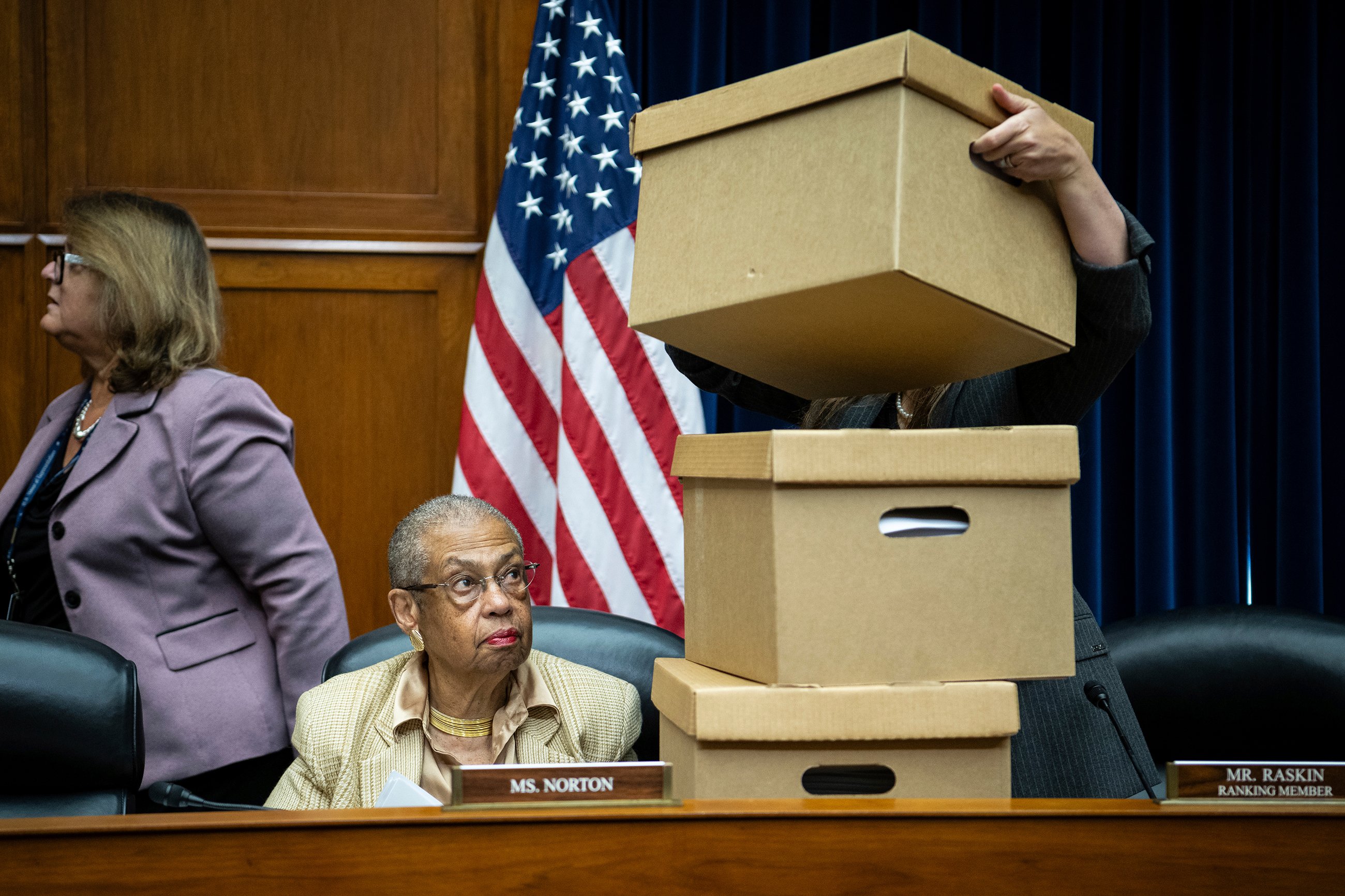
Currently a senior adviser to Bowser, Perry emphasizes that she’s speaking in her private capacity. Such is the respect Norton has earned over her distinguished career: Few prominent people in local politics are comfortable discussing her age. But even by the increasingly gerontocratic standards of national leadership, Norton is old. Older than Joe Biden. Older than Trump. Older than Nancy Pelosi, Mitch McConnell, and Bernie Sanders. Norton is the oldest member of the House. In the Senate, only 91-year-old Iowa Republican Chuck Grassley is older.
Though some close to Norton express uncertainty about her running for reelection next year, she tells Washingtonian she plans to do so. Another victory is likely: In the last three Democratic primaries, she’s won between 79 and 98 percent of the vote. If Norton should seek a 19th term, her age would raise a question—does she still have what it takes to fight for DC?
ne morning in January, I met Norton in her congressional office in the Rayburn building. It felt warm and lived-in. The sofas and armchairs were worn, with fabric pilling in places. There were commemorative tokens, decorative plants, and pictures of Norton’s two adult children, along with historic photos of the city. A DC-statehood-themed quilt hung on the wall above a doorway.
I came with questions. What was Norton doing to defend the District from Republican attacks? Why did she want to run again? Would she fight Trump whenever possible? Or take a more conciliatory approach?
Norton’s answers were mostly gracious, nonspecific, and brief. She misspoke at times and once seemed confused when I switched topics mid-conversation, misunderstanding my next question. Still, she made a case for continuing in her job—reaffirming her commitment to pushing for statehood, pointing to past successes at getting statehood bills passed in the House, and arguing that her experience and longevity are assets in a time of GOP rule and threats to home rule. “The greater the odds,” she said, “the more fight it brings out in me.”
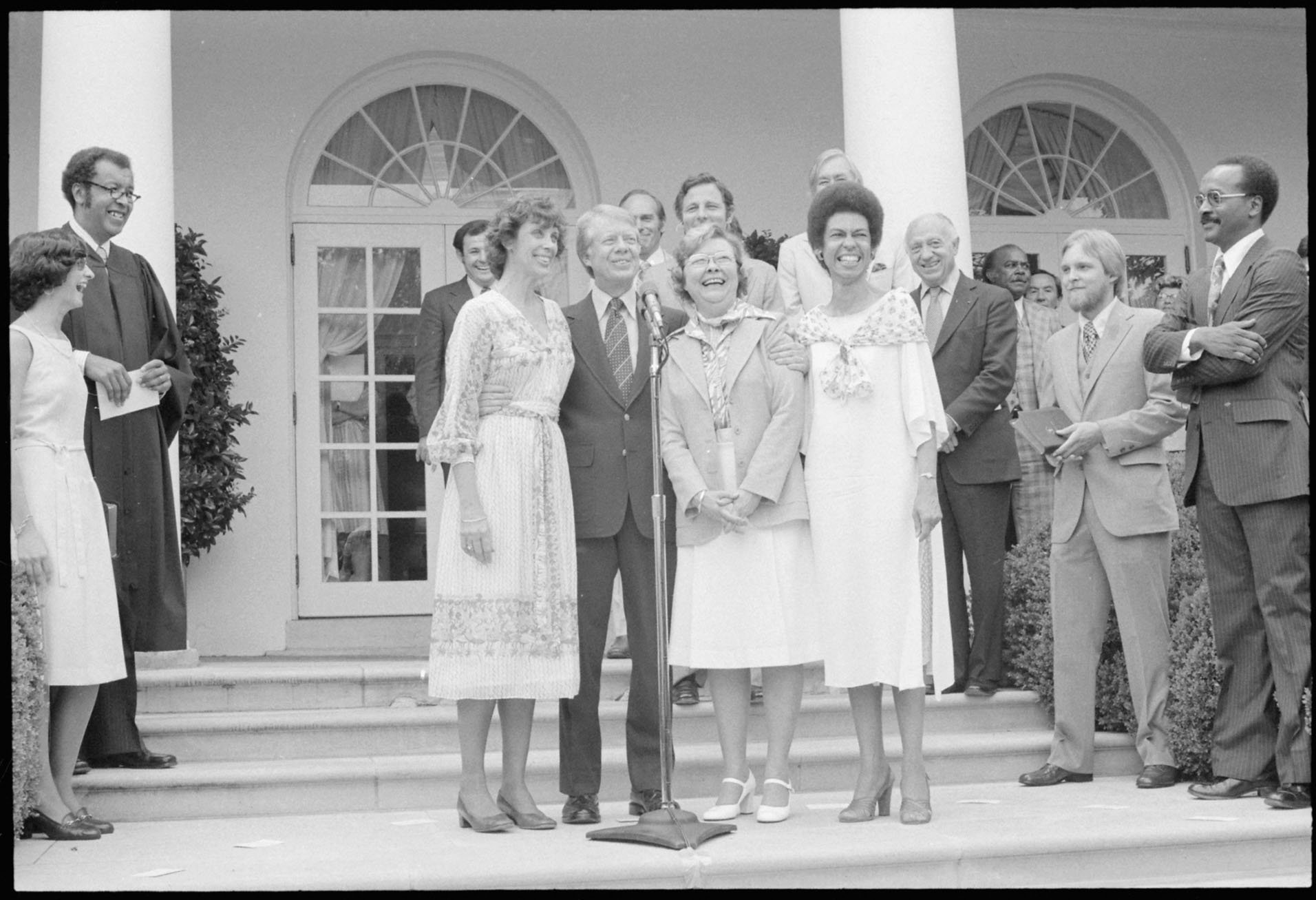
A fourth-generation Washingtonian, Norton has been in the fight for a long time. Her great-grandfather Richard Holmes escaped enslavement in Virginia to walk to DC and find work as a free man. Norton’s parents, who met at Syracuse University, moved back to the District’s thriving, cosmopolitan Black community, where they lived as well as Black Americans could during the Jim Crow 1930s. They owned a series of handsome townhouses in Columbia Heights, Park View, and Petworth, moving up the Georgia Avenue corridor toward the 16th Street “Gold Coast” as Eleanor grew older. Her high school, Dunbar, was the closest thing DC’s segregated public-school system had to a prep school for Black kids. Ivy League universities recruited its students, and the overwhelming majority of its graduates went to college. When the 1954 Brown v. Board of Education Supreme Court decision was announced, Norton once recalled to a biographer, she was in school, watching teachers sob with joy.
Norton chose Antioch College, a progressive bastion in the small town of Yellow Springs, Ohio, which was among the schools investigated by Senator Joseph McCarthy for alleged communist ties. Her friends were lefty Black and Jewish students who wore turtleneck sweaters, jeans, and long skirts, looking the part of 1950s bohemians. She headed the campus NAACP chapter—and in 1960 led sit-ins in segregated cafeterias in nearby Xenia, Ohio, inspired by the Greensboro Four.
Norton spent her next decade at the center of the civil-rights movement. Bayard Rustin, the key organizer of the March on Washington, became her mentor, and as a Yale law student in the Student Nonviolent Coordinating Committee (SNCC), she spent the summer of 1963 in Mississippi turning out voters and providing legal help. The day after Medgar Evers picked her up at the Jackson airport in June, she learned he’d been shot and killed. Soon after, she helped free Fannie Lou Hamer from jail in the town of Winona, where Hamer had been savagely beaten. “That’s how you seal a lifetime of commitment,” Norton later told her biographer, Joan Steinau Lester. “When you’ve had a life-changing experience.”
In 1965, Norton joined the American Civil Liberties Union’s tiny legal staff. The organization’s commitment to free speech meant she represented the segregationist presidential candidate George Wallace, who’d been denied a permit to use Shea Stadium for a rally. Norton would forever say she enjoyed the experience: She viewed no one, even extremists, as beyond engaging and arguing with. Norton also was sought out by progressives, such as the 46 women who successfully sued Newsweek for gender discrimination in 1970. (Joy Bryant played Norton in a 2016 Amazon Prime TV series based on the suit.)
Five years later, New York mayor John Lindsay tapped Norton to head the city’s Human Rights Commission. She earned a reputation as a firebrand perfectionist with a blunt, but not blinkered, approach—talking substantively to everyone, but seemingly unable to make small talk with anyone. She quickly became a New Yorker, living with her then-husband, Edward Norton, and their two kids, Katherine and John, in an Upper West Side apartment. And she came to view her hometown, by her own description, as a “two-horse, racist, Southern, unsophisticated town.”
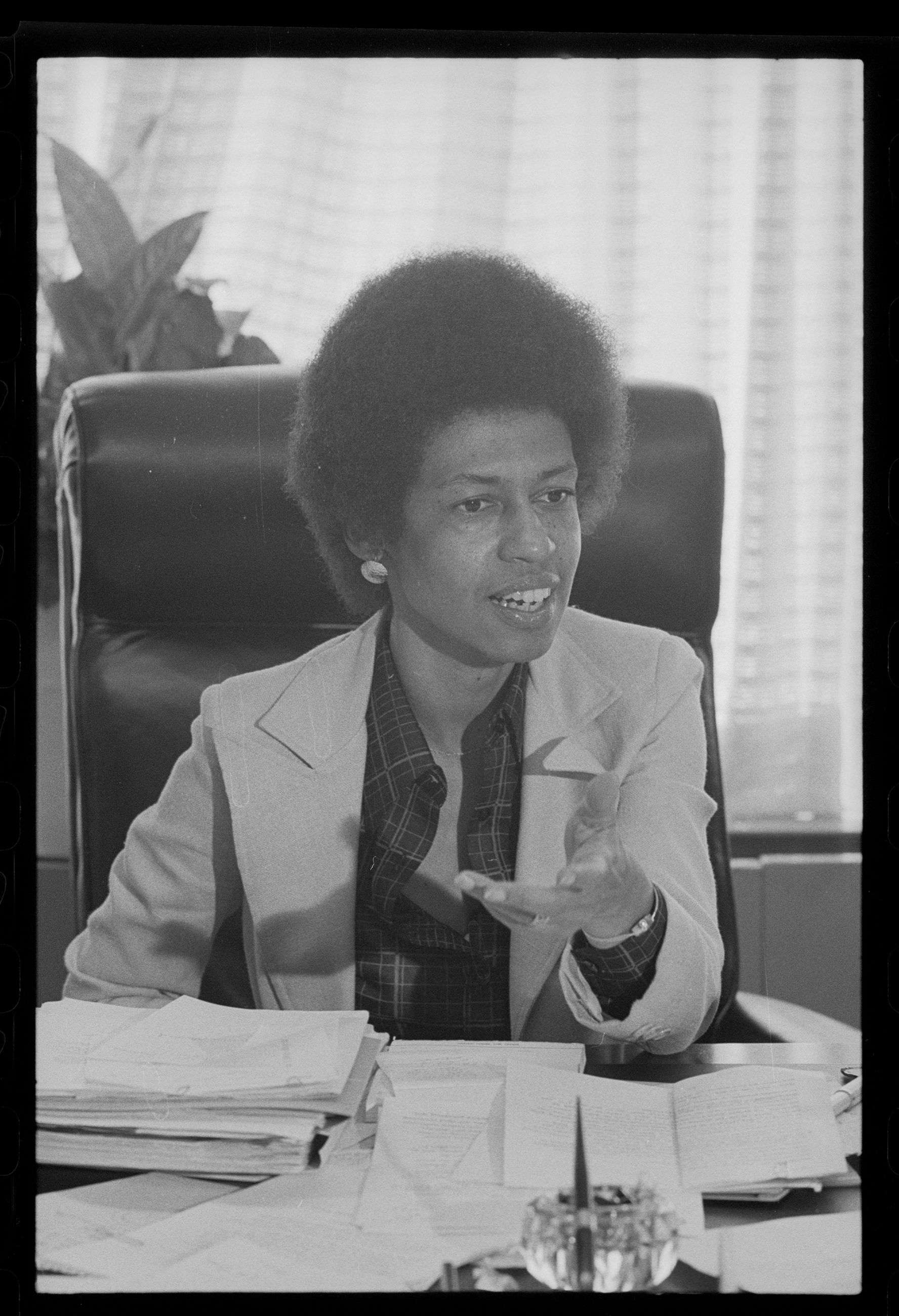
That was partly because the District, a majority-Black enclave, was still held hostage by white Southern Democrats. Today, Washingtonians decry their lack of federal power and representation, pointing out that DC is more populous than two states, Vermont and Wyoming. But in 1960, 13 years before the Home Rule Act, the majority-Black District had a population greater than 11 states—including Nevada, Delaware, and New Hampshire—and no locally elected officials. Residents couldn’t even vote for President.
That stark disenfranchisement was still a recent memory when Norton returned to DC in 1977. President Jimmy Carter selected her as the first female head of the Equal Employment Opportunity Commission, which Norton transformed from a small and neglected agency to the federal government’s primary civil-rights enforcer, shaping nascent sexual-harassment law in the process. But when Ronald Reagan was elected in 1980, Norton resigned. It felt like the end of the era of civil-rights victories—and of liberal ascendance. She spent the Reagan years as a professor at Georgetown Law.

“In a just world,” Gloria Steinem once wrote, Norton “would have been president of the united states.”

Through old SNCC organizers and DC’s Black Democratic circles, Norton remained close to statehood advocates and came to feel she’d be an effective legislative leader. In 1990, Delegate Walter Fauntroy, the first person to represent DC in Congress since 1875, announced he’d be running for mayor. Political operative Donna Brazile felt the delegate’s job had Norton’s name on it and convinced her to join the race. Brazile managed Norton’s campaign, positioning her as an outsider despite her time under Carter. Donors included Senator Daniel Patrick Moynihan, Bill Cosby, and Gloria Steinem, who later wrote that “in a just world, [Norton] would have been president of the United States.”
Norton was the frontrunner in the primary but was rocked by the revelation that she hadn’t filed DC income-tax returns for eight years. In Norton’s telling, she’d understood that her husband had been handling their taxes and he’d betrayed her trust by failing to file. (Edward had also become less supportive of her political ambitions, according to Norton’s biographer, Lester. They separated soon after the election, and Eleanor never remarried.) The Washington Post endorsed DC Council member Betty Ann Kane the day before the primary—and even after Norton won in a squeaker, its columnists continued to write about her “representation without taxation.”
Norton entered office at the start of a rough decade for the District, which soon had a junk-bond credit rating and an $800 million budget shortfall. She was a freshman nonvoting delegate without many relationships in Congress, which was just 6 percent female and overwhelmingly white. During her first year, however, she spoke more than any other member. It was a relative golden age of Capitol Hill cooperation and compromise, and Norton won hundreds of millions in new funding for DC while shepherding a bill to create the African American Civil War Memorial on U Street. In 1993, she even got the House to vote on District statehood. Though the measure failed, it gave hope to activists, who kept up the fight with Norton’s quiet advisory support.

Then came 1994’s “Republican Revolution,” which gave the GOP a House majority for the first time since 1955, installed Newt Gingrich as speaker, and did away with Norton’s and other delegates’ limited right to vote in the Committee of the Whole. Marion Barry, a figure distrusted and dismissed by House Republicans, had been reelected as mayor. The District’s shrinking middle-class tax base and unchecked deficit spending had created a budget crisis. Congress was grumbling about a financial takeover.
Norton successfully advocated for a different solution: a five-member control board overseeing the city’s finances. All of the members were local. Four out of five were Black. “She was critical in making sure that Congress didn’t take over the city,” says Tom Davis, a Virginia Republican who cosponsored several bills with Norton during the 1990s and 2000s. In 1997, she backed the Revitalization Act, which stripped Barry of certain mayoral powers while having the federal government fund the District’s pension fund as well as court and prison costs. Home-rule hardliners and hostile congressional conservatives alike criticized both moves—but over time they helped ease DC’s financial woes, paving the way for an economic recovery around the turn of the millennium.
Those who know Norton best often cite this period as a high point in her career, particularly her efforts to win over Gingrich as a behind-the-scenes “guardian angel” for the District. Since then, she has played offense and defense—including blocking a number of hostile riders on DC’s budgets—depending on the mood and makeup of Capitol Hill. Today, Norton sees congressional threats to DC’s limited, hard-won sovereignty as “even more severe” than in the control-board era—and as a reason for her to remain in office. “[Trump] even talks about abolishing the DC government itself,” Norton says. “So we have our work cut out for us.”
n a video recorded from the window of a congressional building, a silver Ford Focus inches haltingly into a parking space. Every other car on the block is parked at a 45-degree angle to the curb, but the Focus is jammed in perpendicularly, its back end wedged against a parked red SUV. Outside the car, a suited aide frantically offers directions, striding around and gesticulating.
“Eleanor Holmes Norton is struggling to park her car right now,” the video’s narrator says. “She has hit that red car next to her repeatedly.”
Norton steps out of the car and locks it. She shuffles away, then stops and glances back at the car, still stuck at a 90-degree angle. She returns to get something from the driver’s seat and again walks off, her aide in tow.
“If she parks like that,” the narrator says, “she should not be a member of Congress anymore.”
Roll Call posted this video, titled “Congresswoman Demonstrates ‘Worst Parking Job Ever,’ ” to YouTube in 2015. Since watched more than 1.4 million times, it’s the sort of moment that could be electoral poison for an older politician, akin to Joe Biden’s painfully halting and garbled performance in the first 2024 presidential debate.
But with DC voters, Norton’s age hasn’t been much of a liability. Local Republicans are too irrelevant to meaningfully attack her, and it’s almost impossible to find a local Democratic insider who will publicly question a living legend. Kymone Freeman, a Green Party candidate who ran against her in last year’s general election, used campaign posters with a faint image of Norton’s face, appearing to look on approvingly. “Many people believe [Norton has] earned the right to decide what her future should be,” says Tom Sherwood, a longtime DC political analyst.

“She’s done a good job and she’s been able to fortify some things for the District, but in recent years there hasn’t been that fight, that vigor and that push.”

ANC chair and homeless advocate Kelly Mikel Williams has run against Norton in the last two Democratic primaries, capturing 6.2 percent of the vote in 2022 and 19 percent last year. He isn’t afraid to criticize her for missing chances to secure statehood—especially during the Democratic trifecta of 2009—and for failing to land more federal funding for the District. But otherwise, Williams chooses his words carefully. “She’s done a good job and she’s been able to fortify some things for the District, but in recent years there hasn’t been that fight, that vigor and that push,” he says.
Earlier in Norton’s congressional tenure, her vigor was unquestioned. Some of her staffers were burned out by her pace, and it wasn’t until the 2000s—when Norton reached her mid-sixties—that she began taking a few weeks of summer vacation in Oak Bluffs, a historically Black vacation spot on Martha’s Vineyard. These days, however, her public presence has receded. When Bowser held a March press conference to decry a congressional spending deal that would cut $1 billion from DC’s budget, Norton’s contribution was limited to a few remarks. During a telephone town hall the same month, she offered short, stilted answers to constituents’ questions and concerns about the ongoing gutting of the federal workforce, otherwise deferring to staff or guest speakers from the American Federation of Government Employees. Twice, long periods of dead air prompted a moderator to ask, “Congresswoman, are you still with us?” By the second half of the 80-minute call, Norton wasn’t speaking at all.
Her influence on Capitol Hill may be waning, too. Last year, Bowser’s office worked with Congress to promote legislation allowing the District to potentially bring a new Washington Commanders stadium to the federally controlled RFK Stadium site—encroaching on what has traditionally been Norton’s turf. Reaching across the aisle has long been one of her strengths, but when asked by Washingtonian to name a specific Republican member she currently works closely with, Norton declined to answer.
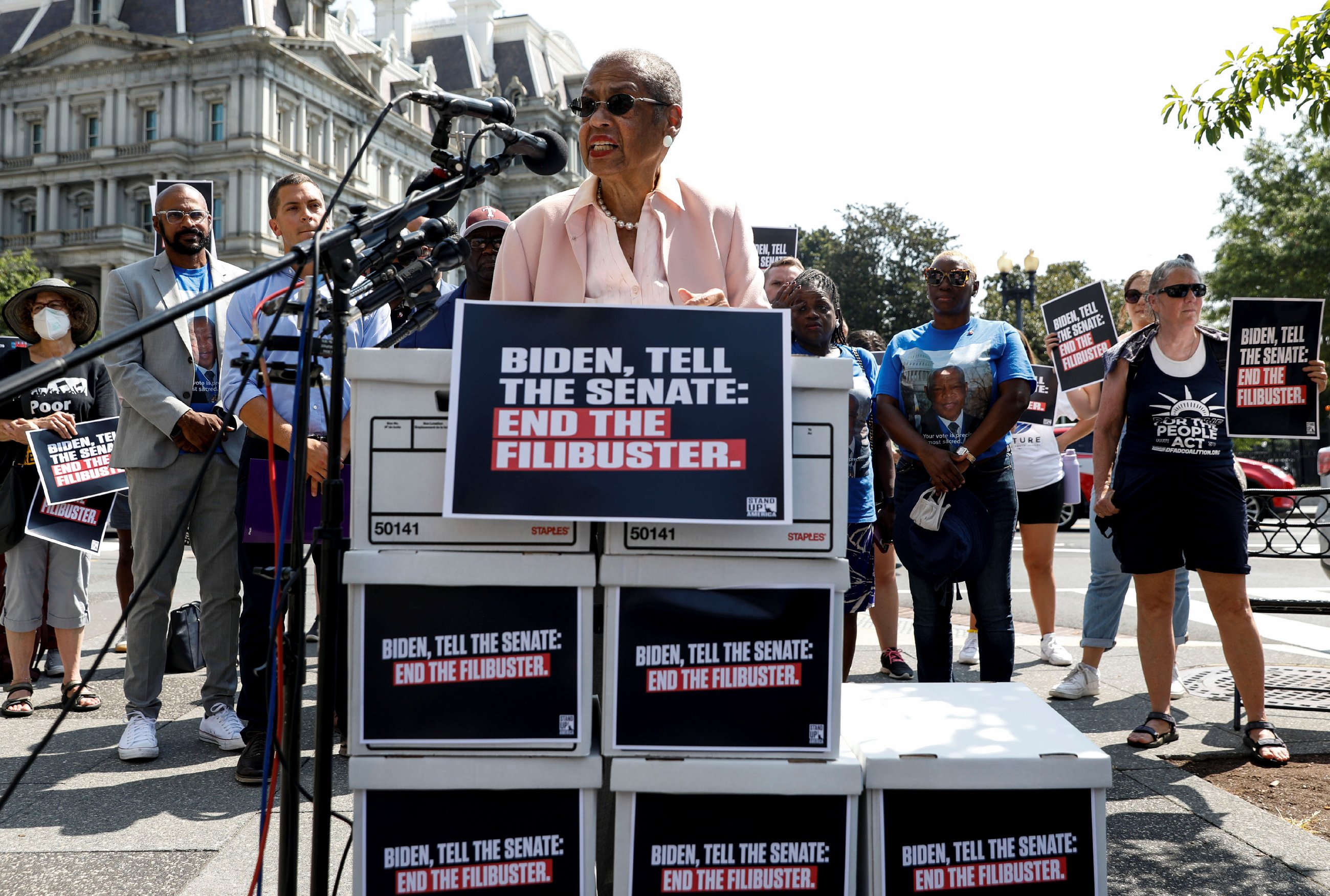
Many sources Washingtonian spoke to expressed private doubts about Norton’s fitness for office, but none would comment for attribution. Her strongest defenders touted her long record of accomplishments, not her current fitness. Washingtonian also contacted nearly a dozen former and current Norton staffers to discuss their experiences. None would.
Responding to emailed questions about Norton’s age and some of the incidents described in this story, her office declined to address them individually, instead providing a written statement from Norton. Citing her consistently high rankings from the Center for Effective Lawmaking, a scholarly collaboration between the University of Virginia and Vanderbilt University that evaluates lawmaker performance, the statement touted her ability to achieve results “despite lacking a vote on the House floor and partners who are accountable to DC residents in the Senate.” The statement also reaffirmed Norton’s commitment to “passionately defend[ing] home rule and DC’s right to govern itself” and said she was “fully able to continue doing so effectively.”
In our interview, Norton said she remained committed to District statehood as well, never mind the long odds of that happening under unified GOP rule. “We’re not going to give up on it,” she said. “You shouldn’t stand down. You should be more determined than ever.”
Williams, Norton’s Democratic primary challenger, shares that determination. But he believes the District needs new blood to advance its goals in Congress. “In the 34 years she’s been there, we’ve had seven different Presidents, four of which have been elected twice, we’ve had six different mayors, we’ve had 14 different school chancellors, we’ve had nine different speakers, and we’ve had 12 different coaches for the Commanders,” he says. “We’ve only had one delegate. We allow our congressional members a pass that we don’t allow others.”
n a snowy morning in February, Georgia Republican representative Marjorie Taylor Greene calls a House Oversight subcommittee hearing to order. The new subcommittee is named Delivering on Government Efficiency, uncoincidentally sharing its acronym with DOGE, the Musk-led outfit ram-paging through the federal bureaucracy.
Grandstanding about government waste, the Republicans in attendance question witnesses about welfare fraud. Democrats respond with some grandstanding of their own, asking why Greene and others were looking into the “$65 a day” someone’s grandmother might receive from Social Security—and not the millions of dollars in defense contracts awarded to Musk’s companies, Starlink and SpaceX.
The hearing begins at 10 am. For more than an hour, there’s no sign of Norton beyond her name placard. She appears to be the only absent Democrat, though several other members arrive late. In those moments, it’s easy to wonder why Norton, who has sat on the House Oversight Committee for more than 30 years, still wants her job. After all, politics is more polarized than ever. Legislative victories are getting harder to come by. The Hill remains a place for warriors, but the battles are bloodier. If Norton wins another term, she’ll be 91 by the end of it. She could simply retire instead, admired by many, her place in history secure.
Bernard Demczuk, a veteran professor and labor leader who has known Norton since the SNCC days, says his old friend sees her job as her life’s mission. Departing would be surrendering. “She was always pissed, which is exactly what I enjoy about her,” Demczuk says. “She’s always angry at injustice and always pissed at unfairness.”
Former DC Council chair Jack Evans joined the council in the same election cycle that saw Norton first elected to Congress. He served for 30 years, running for mayor twice before finally resigning amid ethics scandals—only to mount multiple failed comebacks. “You want it to end on a high note,” he says, before quoting Kenny Rogers’s song “The Gambler.” “ ‘You gotta know when to hold ’em, know when to fold ’em,’ ” he says. “But that’s something I can’t understand. I don’t wanna fold ’em—I wanna run again!”
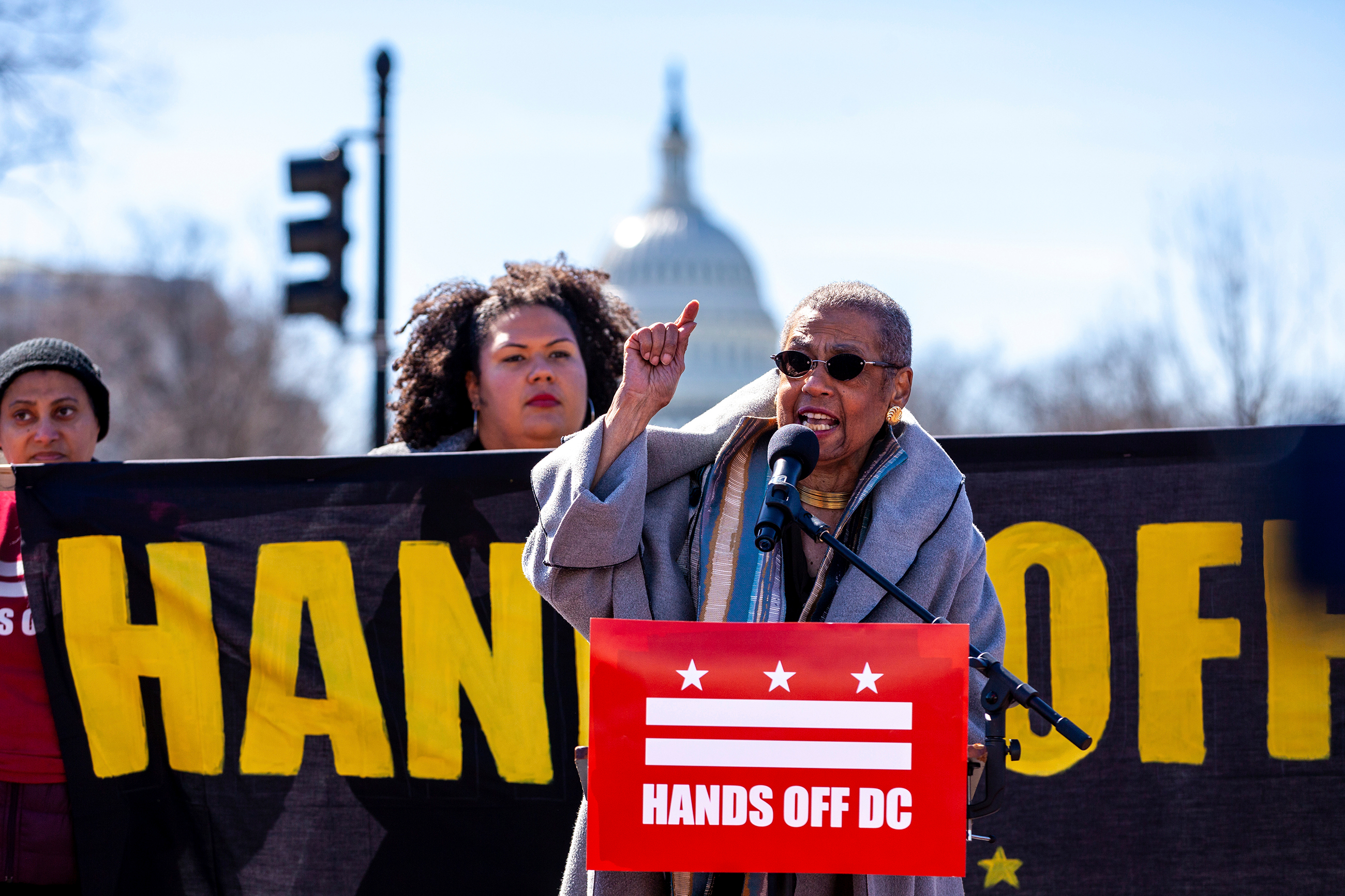
Just before 11:30 am, Norton finally arrives at the hearing. After being recognized, she reads a statement accusing Republicans of “demonizing our friends and neighbors who work for the federal government.” Working from prepared questions, she asks the Democrats’ sole witness, from the watchdog group Project on Government Oversight, whether a mass exodus of federal workers is good or bad for efficiency. (“I think it’s very clear that chaos is not the friend of efficiency,” the witness replies.) Norton then delivers short biographies of three federal workers, the kind the Trump administration is trying to force out: a mine-safety pioneer at the Department of Labor, an IRS investigator who developed methods for tracking criminal crypto transfers, and the manager of our national cemeteries, the resting places of 4 million veterans.
Up to this point, the morning has been contentious, bombastic, and performative. In particular, Democratic representative Robert Garcia pulled no punches, citing a previous hearing in which Greene showed sexually graphic images of Hunter Biden, President Biden’s son, on posterboards. “In the last Congress, Chairwoman Greene literally showed a dick pic in our oversight congressional hearing, so I thought I’d bring one as well,” he said, brandishing a huge posterboard of Musk. By contrast, Norton’s tone is civil. Her remarks are incisive, if monotonously recited. She seems almost out of place—if not out of time. When she finishes speaking, after just seven minutes in the room, she stands up and walks out, leaving behind an empty seat.
as the District of Columbia’s congressional delegate in 1991, Eleanor Holmes Norton attended nearly 500 events. These weren’t just committee hearings on Capitol Hill. Already an accomplished civil-rights activist and law professor, Norton showed up to Advisory Neighborhood Commission meetings and church gatherings. She spent hours standing around the Cleveland Park Metro stop talking to constituents.
“That was about making sure that residents knew me and knew I was going to work very hard for them,” Norton says. “That’s not quite as necessary anymore because I have quite a record to go by and they understand what I’m going to do.”
Today, the 87-year-old Norton is serving her 18th term in Congress and spends far less time out and about. When she does make appearances, they tend to be brief. Last November, at a book launch for equal-employment-opportunity advocate Pierpont Mobley, she appeared to be unable to stand and get to the podium to speak. That same month, Norton attended a ribbon-cutting concert for the Go-Go Museum in Anacostia. Another attendee who’d worked closely with her for years said hello but felt sure she didn’t recognize him.
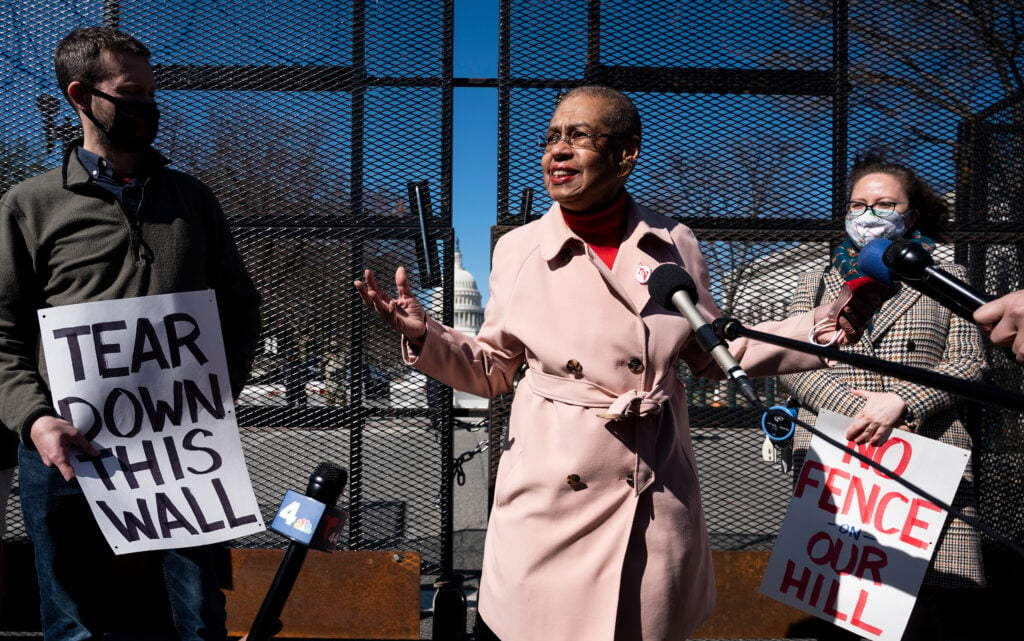
Often called “the warrior on the Hill” by local politicians, Norton is DC’s only elected representative in Congress and just the second person to serve in the position since it was reestablished in 1971. She’s practically synonymous with her job: Over the last 35 years, Washingtonians have voted on 18 ballots that featured her name. Reflecting the District’s unique lack of federal say-so—best summed up by license plates reading taxation without representation—Norton can vote in committee but can’t cast actual votes on the House floor. Nevertheless, she has been an effective advocate, sometimes advancing DC’s interests within the halls of federal power, at other times acting as its first line of defense.
Four months after Donald Trump’s second presidential inauguration, the District needs more defense than ever. During the campaign, Trump promised to “take over” the city, complaining about crime and graffiti. In February, two Republican lawmakers reintroduced a bill that would repeal the Home Rule Act, overturning more than 50 years of local control. After Georgia representative Andrew Clyde threatened to revoke federal transportation funds, DC mayor Muriel Bowser agreed to tear up the yellow-lettered mural adorning Black Lives Matter Plaza. As that was happening, city officials learned that Congress was considering reducing their 2025 budget by $1 billion. In late March, Trump signed an executive order establishing a federal task force aimed at making the District “safe, beautiful and prosperous” by focusing on goals such as deporting illegal immigrants, cracking down on Metro fare evasion, and speeding up applications for carrying concealed weapons.
Then there’s the Trump administration’s ongoing campaign to shrink the government and purge it of people insufficiently loyal to the President—an effort in which the world’s wealthiest man, Elon Musk, has partnered with GOP politicians to blitz and break agencies such as USAID and the Consumer Financial Protection Bureau. Thousands of federal employees, a significant chunk of the area’s workforce, have already been fired. More cuts and chaos seem likely to come, further threatening a region where the federal government accounts for some 40 percent of the economy.
All of this has prompted many Washingtonians, who live in one of the nation’s politically bluest cities, to wonder whether Democrats are doing enough to fight back—a question that includes the city’s warrior on the Hill. Earlier this year, a popular post on Reddit’s DC site asked: Where is Eleanor Holmes Norton?
“She has been quiet lately,” says Beverly Perry, a veteran DC political adviser. “I think she’s declining in health and it’s hard for her to navigate the political waters as she has in the past.”
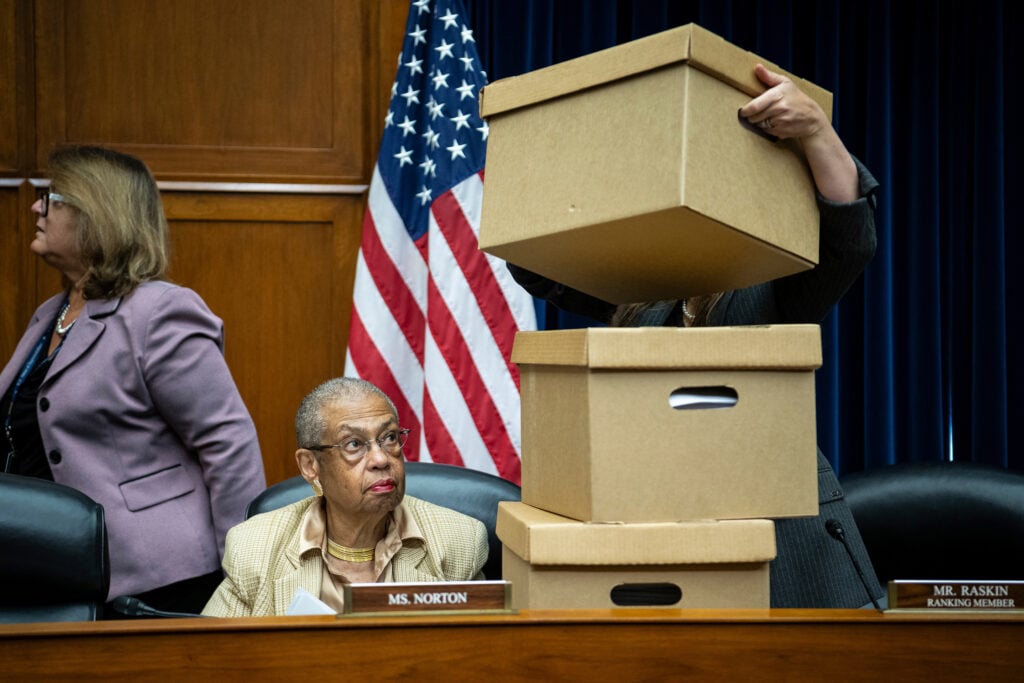
Currently a senior adviser to Bowser, Perry emphasizes that she’s speaking in her private capacity. Such is the respect Norton has earned over her distinguished career: Few prominent people in local politics are comfortable discussing her age. But even by the increasingly gerontocratic standards of national leadership, Norton is old. Older than Joe Biden. Older than Trump. Older than Nancy Pelosi, Mitch McConnell, and Bernie Sanders. Norton is the oldest member of the House. In the Senate, only 91-year-old Iowa Republican Chuck Grassley is older.
Though some close to Norton express uncertainty about her running for reelection next year, she tells Washingtonian she plans to do so. Another victory is likely: In the last three Democratic primaries, she’s won between 79 and 98 percent of the vote. If Norton should seek a 19th term, her age would raise a question—does she still have what it takes to fight for DC?
ne morning in January, I met Norton in her congressional office in the Rayburn building. It felt warm and lived-in. The sofas and armchairs were worn, with fabric pilling in places. There were commemorative tokens, decorative plants, and pictures of Norton’s two adult children, along with historic photos of the city. A DC-statehood-themed quilt hung on the wall above a doorway.
I came with questions. What was Norton doing to defend the District from Republican attacks? Why did she want to run again? Would she fight Trump whenever possible? Or take a more conciliatory approach?
Norton’s answers were mostly gracious, nonspecific, and brief. She misspoke at times and once seemed confused when I switched topics mid-conversation, misunderstanding my next question. Still, she made a case for continuing in her job—reaffirming her commitment to pushing for statehood, pointing to past successes at getting statehood bills passed in the House, and arguing that her experience and longevity are assets in a time of GOP rule and threats to home rule. “The greater the odds,” she said, “the more fight it brings out in me.”

A fourth-generation Washingtonian, Norton has been in the fight for a long time. Her great-grandfather Richard Holmes escaped enslavement in Virginia to walk to DC and find work as a free man. Norton’s parents, who met at Syracuse University, moved back to the District’s thriving, cosmopolitan Black community, where they lived as well as Black Americans could during the Jim Crow 1930s. They owned a series of handsome townhouses in Columbia Heights, Park View, and Petworth, moving up the Georgia Avenue corridor toward the 16th Street “Gold Coast” as Eleanor grew older. Her high school, Dunbar, was the closest thing DC’s segregated public-school system had to a prep school for Black kids. Ivy League universities recruited its students, and the overwhelming majority of its graduates went to college. When the 1954 Brown v. Board of Education Supreme Court decision was announced, Norton once recalled to a biographer, she was in school, watching teachers sob with joy.
Norton chose Antioch College, a progressive bastion in the small town of Yellow Springs, Ohio, which was among the schools investigated by Senator Joseph McCarthy for alleged communist ties. Her friends were lefty Black and Jewish students who wore turtleneck sweaters, jeans, and long skirts, looking the part of 1950s bohemians. She headed the campus NAACP chapter—and in 1960 led sit-ins in segregated cafeterias in nearby Xenia, Ohio, inspired by the Greensboro Four.
Norton spent her next decade at the center of the civil-rights movement. Bayard Rustin, the key organizer of the March on Washington, became her mentor, and as a Yale law student in the Student Nonviolent Coordinating Committee (SNCC), she spent the summer of 1963 in Mississippi turning out voters and providing legal help. The day after Medgar Evers picked her up at the Jackson airport in June, she learned he’d been shot and killed. Soon after, she helped free Fannie Lou Hamer from jail in the town of Winona, where Hamer had been savagely beaten. “That’s how you seal a lifetime of commitment,” Norton later told her biographer, Joan Steinau Lester. “When you’ve had a life-changing experience.”
In 1965, Norton joined the American Civil Liberties Union’s tiny legal staff. The organization’s commitment to free speech meant she represented the segregationist presidential candidate George Wallace, who’d been denied a permit to use Shea Stadium for a rally. Norton would forever say she enjoyed the experience: She viewed no one, even extremists, as beyond engaging and arguing with. Norton also was sought out by progressives, such as the 46 women who successfully sued Newsweek for gender discrimination in 1970. (Joy Bryant played Norton in a 2016 Amazon Prime TV series based on the suit.)
Five years later, New York mayor John Lindsay tapped Norton to head the city’s Human Rights Commission. She earned a reputation as a firebrand perfectionist with a blunt, but not blinkered, approach—talking substantively to everyone, but seemingly unable to make small talk with anyone. She quickly became a New Yorker, living with her then-husband, Edward Norton, and their two kids, Katherine and John, in an Upper West Side apartment. And she came to view her hometown, by her own description, as a “two-horse, racist, Southern, unsophisticated town.”
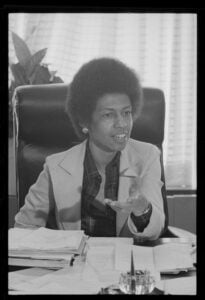
That was partly because the District, a majority-Black enclave, was still held hostage by white Southern Democrats. Today, Washingtonians decry their lack of federal power and representation, pointing out that DC is more populous than two states, Vermont and Wyoming. But in 1960, 13 years before the Home Rule Act, the majority-Black District had a population greater than 11 states—including Nevada, Delaware, and New Hampshire—and no locally elected officials. Residents couldn’t even vote for President.
That stark disenfranchisement was still a recent memory when Norton returned to DC in 1977. President Jimmy Carter selected her as the first female head of the Equal Employment Opportunity Commission, which Norton transformed from a small and neglected agency to the federal government’s primary civil-rights enforcer, shaping nascent sexual-harassment law in the process. But when Ronald Reagan was elected in 1980, Norton resigned. It felt like the end of the era of civil-rights victories—and of liberal ascendance. She spent the Reagan years as a professor at Georgetown Law.

“In a just world,” Gloria Steinem once wrote, Norton “would have been president of the united states.”

Through old SNCC organizers and DC’s Black Democratic circles, Norton remained close to statehood advocates and came to feel she’d be an effective legislative leader. In 1990, Delegate Walter Fauntroy, the first person to represent DC in Congress since 1875, announced he’d be running for mayor. Political operative Donna Brazile felt the delegate’s job had Norton’s name on it and convinced her to join the race. Brazile managed Norton’s campaign, positioning her as an outsider despite her time under Carter. Donors included Senator Daniel Patrick Moynihan, Bill Cosby, and Gloria Steinem, who later wrote that “in a just world, [Norton] would have been president of the United States.”
Norton was the frontrunner in the primary but was rocked by the revelation that she hadn’t filed DC income-tax returns for eight years. In Norton’s telling, she’d understood that her husband had been handling their taxes and he’d betrayed her trust by failing to file. (Edward had also become less supportive of her political ambitions, according to Norton’s biographer, Lester. They separated soon after the election, and Eleanor never remarried.) The Washington Post endorsed DC Council member Betty Ann Kane the day before the primary—and even after Norton won in a squeaker, its columnists continued to write about her “representation without taxation.”
Norton entered office at the start of a rough decade for the District, which soon had a junk-bond credit rating and an $800 million budget shortfall. She was a freshman nonvoting delegate without many relationships in Congress, which was just 6 percent female and overwhelmingly white. During her first year, however, she spoke more than any other member. It was a relative golden age of Capitol Hill cooperation and compromise, and Norton won hundreds of millions in new funding for DC while shepherding a bill to create the African American Civil War Memorial on U Street. In 1993, she even got the House to vote on District statehood. Though the measure failed, it gave hope to activists, who kept up the fight with Norton’s quiet advisory support.

Then came 1994’s “Republican Revolution,” which gave the GOP a House majority for the first time since 1955, installed Newt Gingrich as speaker, and did away with Norton’s and other delegates’ limited right to vote in the Committee of the Whole. Marion Barry, a figure distrusted and dismissed by House Republicans, had been reelected as mayor. The District’s shrinking middle-class tax base and unchecked deficit spending had created a budget crisis. Congress was grumbling about a financial takeover.
Norton successfully advocated for a different solution: a five-member control board overseeing the city’s finances. All of the members were local. Four out of five were Black. “She was critical in making sure that Congress didn’t take over the city,” says Tom Davis, a Virginia Republican who cosponsored several bills with Norton during the 1990s and 2000s. In 1997, she backed the Revitalization Act, which stripped Barry of certain mayoral powers while having the federal government fund the District’s pension fund as well as court and prison costs. Home-rule hardliners and hostile congressional conservatives alike criticized both moves—but over time they helped ease DC’s financial woes, paving the way for an economic recovery around the turn of the millennium.
Those who know Norton best often cite this period as a high point in her career, particularly her efforts to win over Gingrich as a behind-the-scenes “guardian angel” for the District. Since then, she has played offense and defense—including blocking a number of hostile riders on DC’s budgets—depending on the mood and makeup of Capitol Hill. Today, Norton sees congressional threats to DC’s limited, hard-won sovereignty as “even more severe” than in the control-board era—and as a reason for her to remain in office. “[Trump] even talks about abolishing the DC government itself,” Norton says. “So we have our work cut out for us.”
n a video recorded from the window of a congressional building, a silver Ford Focus inches haltingly into a parking space. Every other car on the block is parked at a 45-degree angle to the curb, but the Focus is jammed in perpendicularly, its back end wedged against a parked red SUV. Outside the car, a suited aide frantically offers directions, striding around and gesticulating.
“Eleanor Holmes Norton is struggling to park her car right now,” the video’s narrator says. “She has hit that red car next to her repeatedly.”
Norton steps out of the car and locks it. She shuffles away, then stops and glances back at the car, still stuck at a 90-degree angle. She returns to get something from the driver’s seat and again walks off, her aide in tow.
“If she parks like that,” the narrator says, “she should not be a member of Congress anymore.”
Roll Call posted this video, titled “Congresswoman Demonstrates ‘Worst Parking Job Ever,’ ” to YouTube in 2015. Since watched more than 1.4 million times, it’s the sort of moment that could be electoral poison for an older politician, akin to Joe Biden’s painfully halting and garbled performance in the first 2024 presidential debate.
But with DC voters, Norton’s age hasn’t been much of a liability. Local Republicans are too irrelevant to meaningfully attack her, and it’s almost impossible to find a local Democratic insider who will publicly question a living legend. Kymone Freeman, a Green Party candidate who ran against her in last year’s general election, used campaign posters with a faint image of Norton’s face, appearing to look on approvingly. “Many people believe [Norton has] earned the right to decide what her future should be,” says Tom Sherwood, a longtime DC political analyst.

“She’s done a good job and she’s been able to fortify some things for the District, but in recent years there hasn’t been that fight, that vigor and that push.”

ANC chair and homeless advocate Kelly Mikel Williams has run against Norton in the last two Democratic primaries, capturing 6.2 percent of the vote in 2022 and 19 percent last year. He isn’t afraid to criticize her for missing chances to secure statehood—especially during the Democratic trifecta of 2009—and for failing to land more federal funding for the District. But otherwise, Williams chooses his words carefully. “She’s done a good job and she’s been able to fortify some things for the District, but in recent years there hasn’t been that fight, that vigor and that push,” he says.
Earlier in Norton’s congressional tenure, her vigor was unquestioned. Some of her staffers were burned out by her pace, and it wasn’t until the 2000s—when Norton reached her mid-sixties—that she began taking a few weeks of summer vacation in Oak Bluffs, a historically Black vacation spot on Martha’s Vineyard. These days, however, her public presence has receded. When Bowser held a March press conference to decry a congressional spending deal that would cut $1 billion from DC’s budget, Norton’s contribution was limited to a few remarks. During a telephone town hall the same month, she offered short, stilted answers to constituents’ questions and concerns about the ongoing gutting of the federal workforce, otherwise deferring to staff or guest speakers from the American Federation of Government Employees. Twice, long periods of dead air prompted a moderator to ask, “Congresswoman, are you still with us?” By the second half of the 80-minute call, Norton wasn’t speaking at all.
Her influence on Capitol Hill may be waning, too. Last year, Bowser’s office worked with Congress to promote legislation allowing the District to potentially bring a new Washington Commanders stadium to the federally controlled RFK Stadium site—encroaching on what has traditionally been Norton’s turf. Reaching across the aisle has long been one of her strengths, but when asked by Washingtonian to name a specific Republican member she currently works closely with, Norton declined to answer.
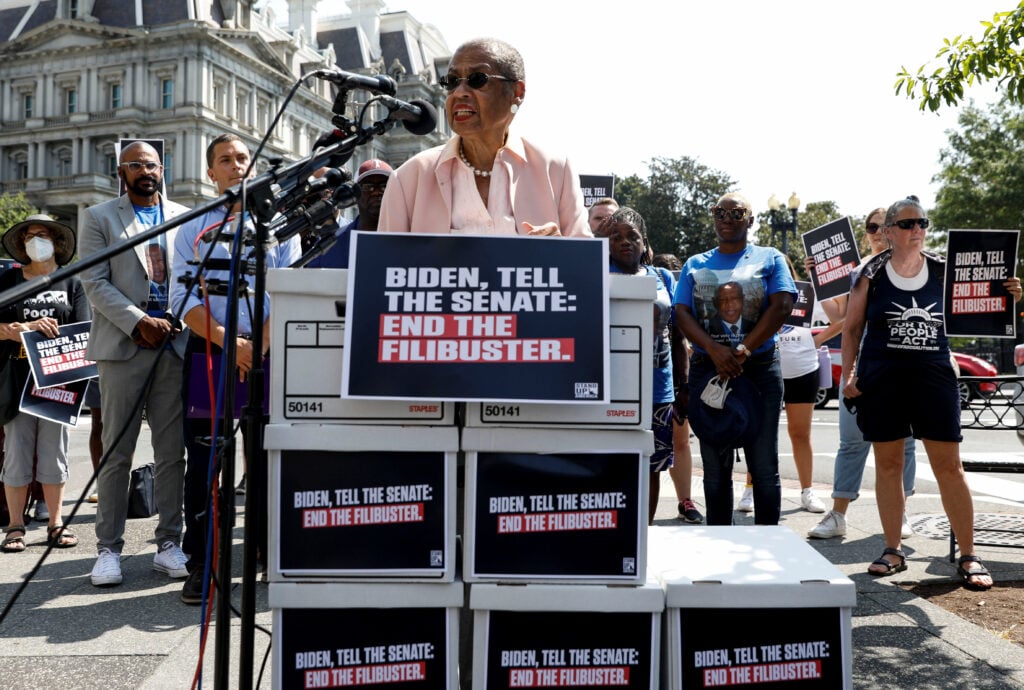
Many sources Washingtonian spoke to expressed private doubts about Norton’s fitness for office, but none would comment for attribution. Her strongest defenders touted her long record of accomplishments, not her current fitness. Washingtonian also contacted nearly a dozen former and current Norton staffers to discuss their experiences. None would.
Responding to emailed questions about Norton’s age and some of the incidents described in this story, her office declined to address them individually, instead providing a written statement from Norton. Citing her consistently high rankings from the Center for Effective Lawmaking, a scholarly collaboration between the University of Virginia and Vanderbilt University that evaluates lawmaker performance, the statement touted her ability to achieve results “despite lacking a vote on the House floor and partners who are accountable to DC residents in the Senate.” The statement also reaffirmed Norton’s commitment to “passionately defend[ing] home rule and DC’s right to govern itself” and said she was “fully able to continue doing so effectively.”
In our interview, Norton said she remained committed to District statehood as well, never mind the long odds of that happening under unified GOP rule. “We’re not going to give up on it,” she said. “You shouldn’t stand down. You should be more determined than ever.”
Williams, Norton’s Democratic primary challenger, shares that determination. But he believes the District needs new blood to advance its goals in Congress. “In the 34 years she’s been there, we’ve had seven different Presidents, four of which have been elected twice, we’ve had six different mayors, we’ve had 14 different school chancellors, we’ve had nine different speakers, and we’ve had 12 different coaches for the Commanders,” he says. “We’ve only had one delegate. We allow our congressional members a pass that we don’t allow others.”
n a snowy morning in February, Georgia Republican representative Marjorie Taylor Greene calls a House Oversight subcommittee hearing to order. The new subcommittee is named Delivering on Government Efficiency, uncoincidentally sharing its acronym with DOGE, the Musk-led outfit ram-paging through the federal bureaucracy.
Grandstanding about government waste, the Republicans in attendance question witnesses about welfare fraud. Democrats respond with some grandstanding of their own, asking why Greene and others were looking into the “$65 a day” someone’s grandmother might receive from Social Security—and not the millions of dollars in defense contracts awarded to Musk’s companies, Starlink and SpaceX.
The hearing begins at 10 am. For more than an hour, there’s no sign of Norton beyond her name placard. She appears to be the only absent Democrat, though several other members arrive late. In those moments, it’s easy to wonder why Norton, who has sat on the House Oversight Committee for more than 30 years, still wants her job. After all, politics is more polarized than ever. Legislative victories are getting harder to come by. The Hill remains a place for warriors, but the battles are bloodier. If Norton wins another term, she’ll be 91 by the end of it. She could simply retire instead, admired by many, her place in history secure.
Bernard Demczuk, a veteran professor and labor leader who has known Norton since the SNCC days, says his old friend sees her job as her life’s mission. Departing would be surrendering. “She was always pissed, which is exactly what I enjoy about her,” Demczuk says. “She’s always angry at injustice and always pissed at unfairness.”
Former DC Council chair Jack Evans joined the council in the same election cycle that saw Norton first elected to Congress. He served for 30 years, running for mayor twice before finally resigning amid ethics scandals—only to mount multiple failed comebacks. “You want it to end on a high note,” he says, before quoting Kenny Rogers’s song “The Gambler.” “ ‘You gotta know when to hold ’em, know when to fold ’em,’ ” he says. “But that’s something I can’t understand. I don’t wanna fold ’em—I wanna run again!”

Just before 11:30 am, Norton finally arrives at the hearing. After being recognized, she reads a statement accusing Republicans of “demonizing our friends and neighbors who work for the federal government.” Working from prepared questions, she asks the Democrats’ sole witness, from the watchdog group Project on Government Oversight, whether a mass exodus of federal workers is good or bad for efficiency. (“I think it’s very clear that chaos is not the friend of efficiency,” the witness replies.) Norton then delivers short biographies of three federal workers, the kind the Trump administration is trying to force out: a mine-safety pioneer at the Department of Labor, an IRS investigator who developed methods for tracking criminal crypto transfers, and the manager of our national cemeteries, the resting places of 4 million veterans.
Up to this point, the morning has been contentious, bombastic, and performative. In particular, Democratic representative Robert Garcia pulled no punches, citing a previous hearing in which Greene showed sexually graphic images of Hunter Biden, President Biden’s son, on posterboards. “In the last Congress, Chairwoman Greene literally showed a dick pic in our oversight congressional hearing, so I thought I’d bring one as well,” he said, brandishing a huge posterboard of Musk. By contrast, Norton’s tone is civil. Her remarks are incisive, if monotonously recited. She seems almost out of place—if not out of time. When she finishes speaking, after just seven minutes in the room, she stands up and walks out, leaving behind an empty seat.
This article appears in the May 2025 issue of Washingtonian.
